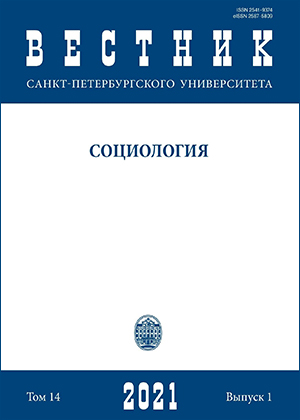Управленческие практики линейных руководителей в контексте поведенческих реакций подчиненных
DOI:
https://doi.org/10.21638/spbu12.2021.104Аннотация
Статья посвящена анализу влияния повседневных практик линейного руководителя на поведение сотрудников, желательное для организации, и установки самих руководителей. В качестве желательного поведения сотрудников были рассмотрены организационно-гражданское поведение, практики самообразования подчиненных, сплоченность трудового коллектива; в качестве рабочих установок линейных руководителей — удовлетворенность работой, вовлеченность в работу, приверженность организации. Эмпирическая часть работы основана на результатах стандартизированного опроса 1116 линейных руководителей из 400 компаний. В ходе исследования автор пришел к нескольким результатам. Во-первых, благодаря факторному анализу 26 переменных были выделены четыре группы повседневных практик линейного руководителя: базовые, к которым
относятся контроль и организация, а также планирование, и расширенные, такие как развитие подчиненных и управление финансами. Во-вторых, практики линейного руководителя по развитию подчиненных оказывают позитивное влияние на желательное поведение подчиненных, в то время как практики по управлению финансами, напротив, разобщают коллектив — сотрудники не стремятся демонстрировать просоциальное поведение, но при этом способствуют демонстрации инициативы и «голоса». Интересно, что практики по развитию подчиненных оказывают также позитивное влияние на рабочие установки линейных руководителей, в то время как управление финансами, напротив, снижает благосостояние руководителей. Соответственно, в целях достижения позитивных результатов повседневные управленческие практики по развитию подчиненных линейных руководителей необходимо расширять, в то время как единоличное управление финансами не приносит столько положительных эффектов.
Ключевые слова:
линейные руководители, повседневные практики управления, организационно-гражданское поведение, поведение сотрудников, установки линейных руководителей, удовлетворенность работой, приверженность организации, просоциальное поведение
Скачивания
Библиографические ссылки
References
Загрузки
Опубликован
Как цитировать
Выпуск
Раздел
Лицензия
Статьи журнала «Вестник Санкт-Петербургского университета. Социология» находятся в открытом доступе и распространяются в соответствии с условиями Лицензионного Договора с Санкт-Петербургским государственным университетом, который бесплатно предоставляет авторам неограниченное распространение и самостоятельное архивирование.




